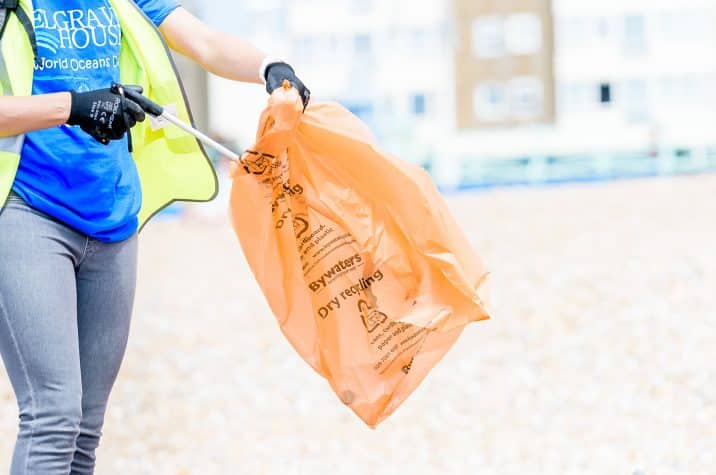In order to ensure as much plastic waste as possible is recycled or reused, we have invested in industry-leading facilities to separate plastic waste from mixed recyclables, which can then be sent across the UK to be recycled into a wide variety of new products.
Additionally to the plastic waste generated by our clients, much of the plastic waste recycled by Bywaters is recovered from beaches and riverbanks across the UK during our regular beach cleans. Through these we help to stop more plastic ending up in the world’s oceans and raise awareness of ocean plastic pollution.
Sorting Plastic into 3 Different Streams at our MRF
The jewel in Bywaters’ crown is our solar powered Materials Recovery Facility (MRF) in Bow. Last year, this facility segregated nearly 6,500 tonnes of plastics for recycling, and we’re making constant improvements to raise its output.
One of the central problems with recycling plastic is the variety of different sorts of plastic there are. In order to be recycled efficiently, and prevent further plastic pollution in the world’s oceans, plastic waste must all be of the same type (e.g. milk bottles in one stream, drinks bottles in another).
This means that after plastics have been separated from mixed recycling waste, they must go through an additional process to separate them from each other. Using high-tech optical sorters, our MRF is able to sort plastic into three different streams:
PET
PET, or polyethylene terephthalate, is a form of plastic used make most bottles for soft drinks, and is also used widely in the manufacturing of clothes. PET plastic can be recycled into new bottles and containers, as well as fibres that can be used to make new clothing.
HDPE
HDPE (high-density polyethylene) is used in the manufacture of durable packaging, along with toys, chemical containers, and plastic pipes. Recycled HDPE can be used to make milk bottles, cereal box liners, plastic shopping bags, and shampoo bottles.
Mixed Plastics
Our MRF bales all plastics that aren’t PET or HDPE together in order to transport them to specialised facilities for separating hard rigid plastics from each other. These plastics will then ultimately be recycled into a variety of items, including packaging, insulation, and t-shirts.
Making Plastic Recycling Possible
Our MRF carries out the first stage in the recycling process: sorting plastic waste into different streams. This enables more efficient recycling, and more durable end products, further down the supply chain and reduces the number of new plastic products being manufactured.


